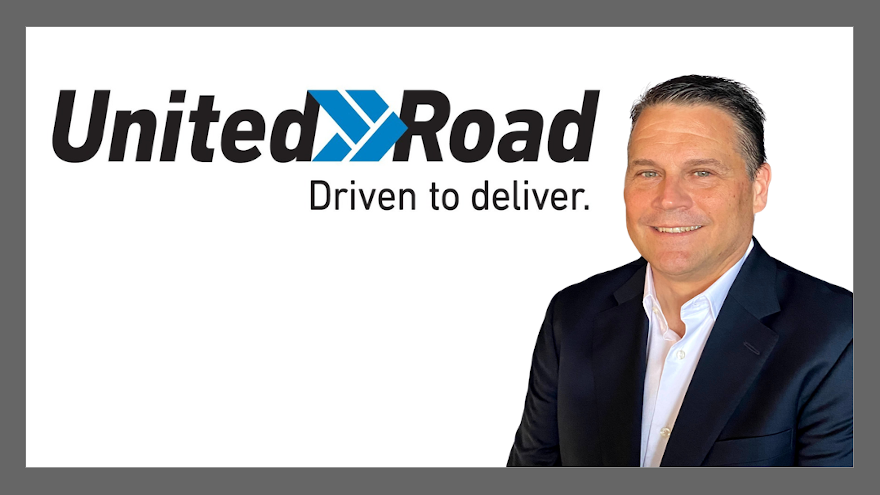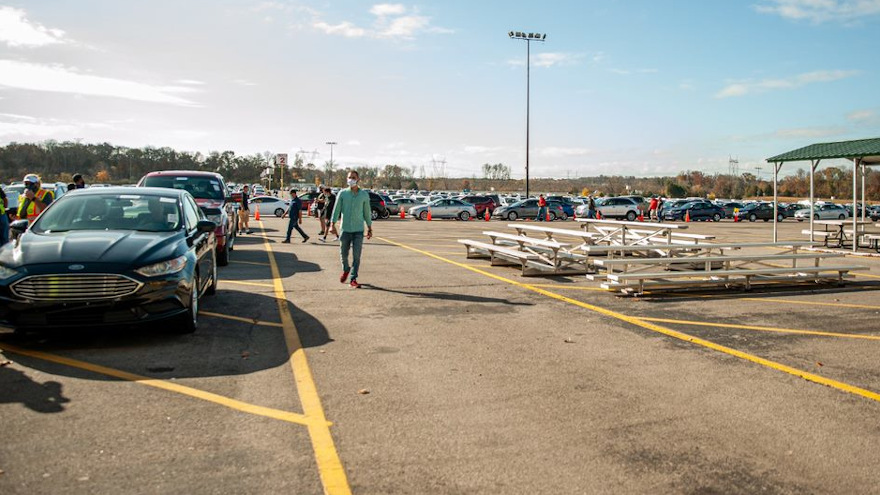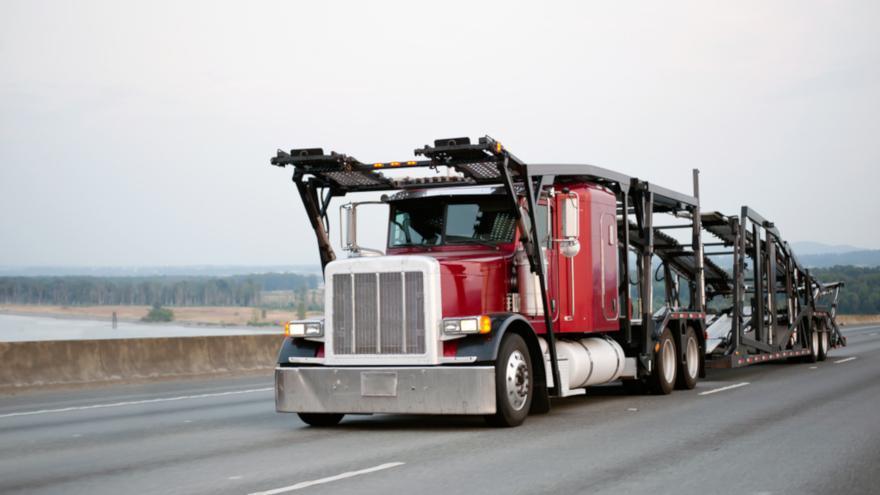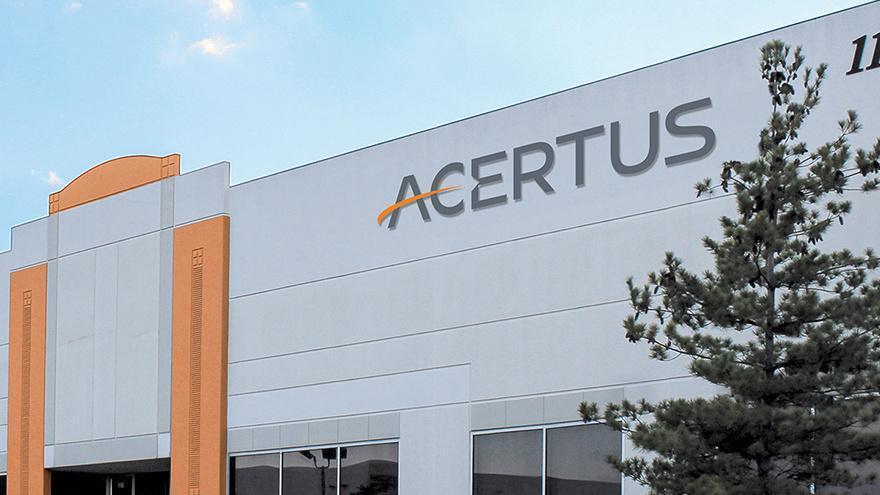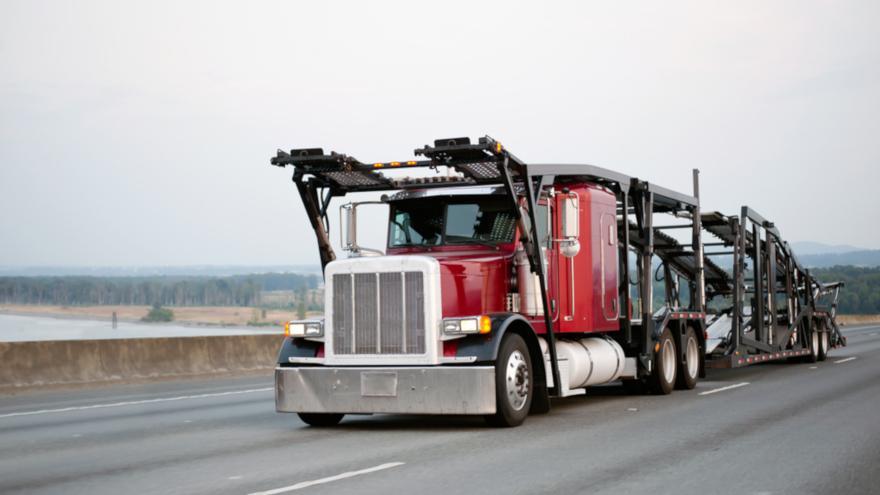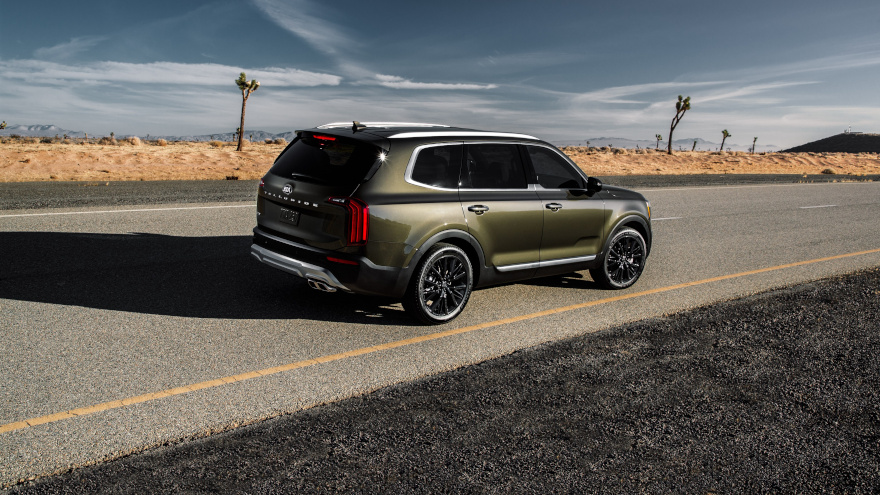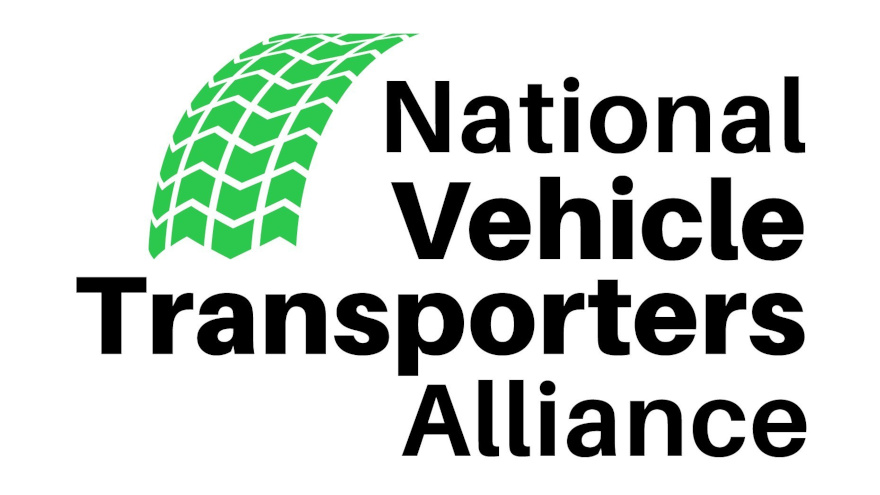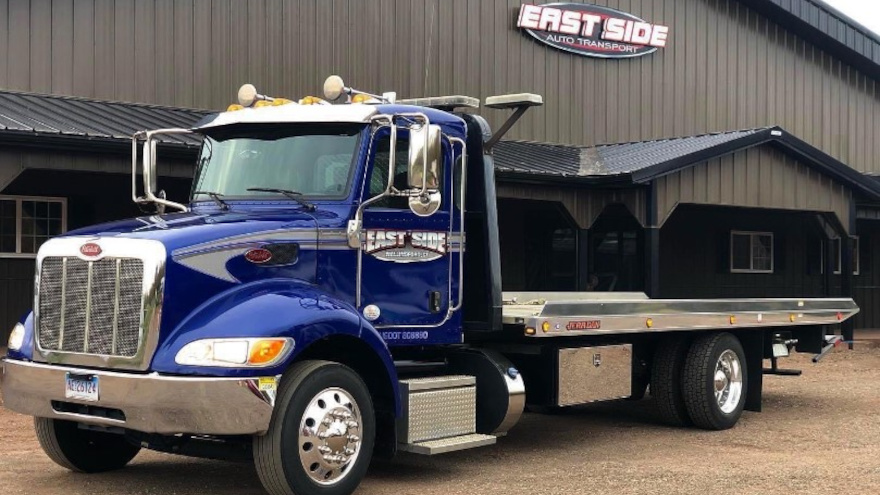United Road wants to be agile and nimble when it comes to being a provider of finished vehicle transport logistics in North America.
And the company’s newest executive has experience working with major automotive industry brands that needed those attributes.
This week, United Road president and chief executive officer Mark Anderson announced the appointment of Nick Cole as senior vice president of sales and marketing.
Cole most recently served as senior vice president of sales for Local Motors in Chandler, Ariz., where he was responsible for bringing “Olli,” an electric, 3-D printed autonomous shuttle, to market.
Previously, Cole served as president of Avis Budget Group’s EMEA Zipcar car-sharing division and earlier as president and CEO of Daimler AG’s Car2go app-driven short-term car rental business in North America.
According to a news release, Cole’s primary focus will be to maintain United Road’s position in the OEM sector, expand the volume in remarketed vehicles and increase heavy Class-8 vehicle and fleet moves.
“Nick has deep experience in developing a value proposition, in fostering lasting relationships with customers that will ensure United Road brings value-based solutions to market,” Anderson said in the news release. “While OEMs will continue to be a focus of United Road, Nick’s first charge is to lead our growth in the remarketed sector where we plan to double our market share over the next two years and grow United Road’s Team DriveAway heavy equipment hauling business.
“Disruptions caused by Covid and the chip shortage have created unexpected opportunities for growth particularly in remarketed vehicles,” Anderson continued.
“United Road’s mission is to be the supplier and employer of choice in finished vehicle logistics. Nick’s diverse experience in mobility, rental, OEMs, fleet and commercial vehicles, heavy equipment, electric and autonomous vehicles brings a unique perspective to United Road’s team,” Anderson went on to say.
Cole sees an opportunity for further diversification and growth in United Road’s customer base and solutions.
“The logistics industry is evolving, innovating right under our feet,” Cole said. “United Road is forward-thinking. Agile. Our culture is to partner with our customers and carriers to deliver technology-driven solutions that drive quality and efficiency. I am excited and energized by the road ahead.”
With time being money, looking for the units you purchased at auction can be costly and frustrating in a sea of similar-looking silver sedans, black SUVs and white pickups.
It’s why Manheim was glad to share the ongoing success of its solution to that challenge — LotVision — which prompted at least one user to say, “I was able to go right to the vehicle.”
During the past year, Manheim said it has expanded LotVision to include more than half of all locations nationwide, enabling more clients to find their vehicles faster, while saving time and enjoying greater efficiencies.
Manheim noted in a news release this week that the technology is on track to be fully deployed by Sept. 30 to all remaining sites, minus a handful of locations that the company said do not compel the need for this tool.
Manheim recapped that LotVision is a wireless tracking device placed in a vehicle that can help dealers and transporters accurately locate their vehicles on auction lots to within 10 feet.
In addition to location tracking, Manheim recently partnered with Cox2M, the commercial IoT business line within Cox Communications, to launch a pilot program at Manheim Atlanta and Manheim Dallas that offers enhanced capabilities, such as accessing certain types of vehicle data via diagnostic trouble codes and battery health information.
The company indicated the pilot is expected to run through early September, with this added information available to clients before year’s end.
“Since introducing LotVision, it has proved to be a highly useful tool for dealers. From the beginning, we envisioned expanding this technology beyond simply vehicle tracking to include accessing valuable data such as battery health and select vehicle diagnostics,” said Bob Grounds, Manheim associate vice president of operational excellence.
“As our clients continue to look for more detailed vehicle information, we are excited that LotVision will help advance a more transparent marketplace,” Grounds continued in the news release.
Offering tracking capabilities for roughly 90% of Manheim’s vehicle inventory, the company highlighted that LotVision has become the most visited page on mymanheim.com and accessed by approximately 95% of users via a mobile device.
During this past year’s record winter storms, Manheim indicated the technology played a significant role, as snow-piled vehicles that were equipped with the technology no longer required VIN scanning.
Manheim shared in the news release that another user mentioned, “It’s an easy, fast location finder and accurate.”
Yet another user added, “The LotVision mobile app is easy to use and tells you everything you need to locate vehicles at a Manheim auction.”
The company pointed out that LotVision is a component of Manheim’s broader focus on creating a more connected client experience. In collaboration with Cox2M, they developed the GPS tracking hardware that powers LotVision.
The company also mentioned Manheim represents the largest LPWA (low power wide area) commercial IoT network in North America, designed to support greater numbers of connected devices over a larger area.
“LotVision has created operational efficiencies for us and our clients, while improving the overall experience for everyone,” Manheim Southern California general manager Tom Wemhoff said. “Clients tell me that they are saving lots of time by being able to find vehicles on their own without having to walk the entire lot.”
And Manheim said this technology also is being leveraged beyond its auction locations.
The company said dealer clients are also implementing this solution at their own dealerships, working with Cox2M to implement similar technology to track inventory on multiple lots and get vehicle status insights remotely when lot access is limited.
Transporting a vehicle can have a lot of moving parts and, well, logistics involved.
And new partnership aims to help improve the chain of custody, communications and transparency in that process of moving vehicles.
ConditionReports.com has created a new app called “TransportCR” that’s connected to AutoIMS. The tool aims to better capture the transportation inspection by giving the user the ability to take photos and catalogue damage at the time the vehicle is picked up or dropped off.
The app uses geo-tagging, date and time stamps and user-specific authentication.
It aims to give auctions, consignors and dealers a way to ensure accountability all-around when working with independent transporters, should any damage occur.
The TransportCR app’s inspections automatically populate on AutoIMS.com, giving the user an easy way to compare the inspection to the auction condition report.
AutoIMS membership is not required to use TransportCR.
“The beginning of this idea came from our friend, Joe LeMonds, while he was with Carolina Auto Auction,” Joe Miller of AutoIMS said in a news release. “Fast forward many months, and thanks to a very patient team at ConditionReports.com, we are eager to see the value this new tool will now deliver to the industry.”
Greensboro Auto Auction is the first to adopt TransportCR. In the release, general manager Jerry Barker said: “We were in the right place at the right time to test this, and are now excited to partner with both AutoIMS and ConditionReports.com as this new app helps us close a number of gaps with our transporters.”
Added ConditionReports.com chief executive officer Brian Schear: “This app is a potent antidote for an issue that affects so many remarketers. We were uniquely positioned to understand and balance the needs and capabilities of the transporter community with those of the auction and consignor world.
“The Greensboro input paired with AutoIMS support has helped turn this into a robust, easy-to-adopt, value-adding tool,” he added.
Two months after ACERTUS named a new chief executive officer, the tech-driven automotive logistics and services company this week announced the professional who now will be serving in the newly created position of chief revenue officer.
Tasked with leading global sales operations, driving revenue growth and supporting ACERTUS’ ongoing mission to be a leader in automotive logistics is Paul Malone.
“We have built a high-velocity, world-class sales organization and with Malone at the helm, we are well-positioned to enter our next phase of growth,”ACERTUS chief executive officer Trent Broberg said in a news release.
“A proven leader, Paul brings a track record of building and managing high-growth sales organizations along with deep transportation technology experience which made him uniquely positioned for this critical role,” Broberg continued.
From this leadership position, the company reiterated that Malone will oversee global sales efforts, identify new revenue streams, partnerships and opportunities to augment ACERTUS’ growth.
This appointment comes at a time of record expansion for ACERTUS. The company was recently recognized by Inc. for a second year in a row as one of the fastest-growing companies in the United States.
ACERTUS also highlighted Malone excels at leading teams through major transitions including acquisitions, IPOs and rapid growth, bringing more than 20 years of logistics experience at leading companies such as CargoMatic, Truckstop.com and Swift.
“ACERTUS provides unique and unparalleled value to the automotive industry which is currently in the midst of significant disruption. Our comprehensive service offering, proprietary technology solutions and unrivaled focus on the customer have proven to be a winning proposition,” Malone said. “I look forward to further accelerating our customer success and global growth.”
Editor's Note: This is a special preview, available only to CMG Premium subscribers, of Auto Remarketing's "Beyond the Transaction" special supplementary issue.
Scott Johnston said capacity constraints are a top issue in the vehicle transportation industry today.
Putting it simply, that means too many vehicles to move.
“And not enough transport trucks to move them,” said Johnston, who is chief operating officer for automotive inventory management platform CarOffer.
CarOffer and the industry as a whole are seeing many more of what Johnston describes as “onesie-twosie” moves, with transporters moving fewer vehicles at a time, Johnston said.
Others in the industry agree with Johnston.
“The biggest trend we’re seeing is more of the single-car moves,” said David Sperau, co-founder and chief executive officer of Autosled, a digital automotive logistics marketplace.
Autosled co-founder and chief financial officer Dan Sperau (David’s brother) said he expects the strong demand for used vehicles — and demand for transporters for those vehicles — to continue.
“It’s still going to be a shortage of new cars, so there is a ton more used cars that will be moved,” he said.
Density equals efficiency
With the movement of all of those cars, density (or the lack of it) will be a top issue. Density is a transportation company’s dream, said Jason Walker, chief operating officer at United Road, a finished vehicle transport logistics provider. The more density you have, the more efficient you can be, he said.
“And when things are done in a live auction-type environment, you have a greater density of units,” Walker said.
He went on to say, “The transportation providers can cobble together more units at the live auction and operate more efficiently. With things being done in a virtual environment, you disperse that density into so many different places, the transportation providers now will see a lower load factor, which means they’re less efficient.”
But even as transportation providers see their efficiency levels drop, their costs are still there. Or they’re rising. That places upward pressure on prices in the remarketing space.
“To make up for that lack of efficiency, the transportation providers are asking for more and needing to get more, because now they’re picking up more ones and twos instead of threes and fours,” Walker said.
Technology taking over
Times have changed from the days of vehicles coming from many different locations to run through one location, which made things easier for transporters, said Dan Sperau of Autosled. The pandemic is a main reason for that, along with the development of technology such as digital retailing platforms and inspection tools, he said.
“The confidence for dealers to find the vehicle without actually having to physically touch it, is revolutionary,” Sperau said. “Technology is taking over this industry in leaps and bounds … which is why we created Autosled, because of the fact that there is a need for it.”
Sperau said Autosled is set to launch a new fin-tech transport product in the third or fourth quarter of this year that will streamline payment. The product will be a disruptor in the marketplace, he said.
Other companies are introducing new services in the transport business. A service that digital driver assistance services provider Agero introduced in April removes the hassle and minimizes the costs and risks of safely moving vehicles, according to the company.
Agero said it built the new service — called Vehicle Transport — for automotive manufacturers, dealer groups and fleet management companies. The service assists in areas such as contactless service and sale transactions, dealer trades, and transfers to body shops and auction sites.
Driver shortage: Still a real thing
Walker at United Road said the parts shortage affecting OEMs will not go on forever. But the shortage is equally affecting the remarketing side, he said.
“We’re seeing that the demand for remarketed vehicles is screaming through the roof,” Walker said. The need for transporting those vehicles has grown exponentially, he said.
Although live auctions have started back up, Walker is hearing that sales through live auctions are probably down by about 20 to 30%.
“But virtual auction sales are just all the rage right now,” Walker said.
That virtual activity, along with the activity of vendors such as CarMax, Carvana and Vroom, and the activity of dealers conducting more business virtually, is placing greater stress on the transportation end, he said.
Is the transportation industry still seeing a shortage of drivers?
“Yeah, it’s a real thing,” Walker said.
Walker participated in a conference call in May of last year with industry executives and economists, and someone on the call said COVID cured the driver shortage.
“I guess you could say that, but it’s a temporary cure, just because demand dropped so low there were no capacity issues,” Walker said. He added that the stimulus packages have added complexity to the current situation, noting that tax season is a big time of year in the remarketing space. This year, the extension on tax returns has extended the tax season.
“But it’s been amplified by what I call almost a concurrent tax season with stimulus checks,” Walker said.
That is bringing more demand for cars, which brings demand for more drivers. Trucking companies are addressing the driver shortage in various ways. The most obvious way is to pay drivers more, Walker said.
“Everyone is trying to pay more, so I would say driver compensation will always be a foundational piece to an efficient and effective retention strategy,” Walker said.
It all comes down to how drivers are treated and supported, he said.
“That really becomes the calling card and differentiator between one transportation provider and the other,” Walker said. “So the driver shortage is still a thing; the driver shortage will continue to be item No. 1 on all of our lists of concerns in the transportation world. It’s just incumbent on us to look for ways to combat that, and really it’s going to come down to us being inventive with our customers and finding ways to approach this thing strategically instead of tactically.”
United Road alliance supports carriers
Around the first half of last year after the pandemic hit, many transportation carriers left the market as demand dropped.
“Primarily, it was because of insurance,” Walker said. About 500 carriers that United Road used declined to renew their insurance at a level that would allow them to continue hauling in finished vehicle logistics.
“That’s capacity leaving the market,” Walker said. United Road surveyed carriers, asking what their challenges were. The top two were insurance and that they did not have anyone to call when their trucks broke down late at night. Fuel cost was a third concern.
“And from that the concept of NVTA was born,” Walker said of the National Vehicle Transporters Alliance, which United Road launched in April.
“We began working with some partners of ours in each of these three different areas, saying ‘You’ve helped us in the past at United Road. Now we’re asking you to help our partners,’” Walker said.
NVTA serves as a business resource for United Road its Team DriveAway company’s 5,000-plus independent carriers. Eighty-five percent of those carriers are small- to mid-sized. NVTA connects those carriers with cost-saving resources and support services, helping them gain access to the buying power of larger carriers.
“The business premise for NVTA is simple: When our carriers do well, we do well,” Walker said in a news release announcing the formation of NVTA. One transport company saved more than $10,000 on its cargo by switching to NVTA’s insurance.
CarOffer’s dedicated transportation team
Before COVID, transportation for CarOffer used to pretty much take care of itself. The company outsources its transportation to logistics provider, ACERTUS. That company would simply pick up a car from a seller and deliver it to a buyer, and CarOffer would rarely have to engage in that process.
But around last summer, CarOffer dedicated an entire team to manage transportation.
“Our business has grown, which is great, but also with some of these capacity constraints we need more eyes to make sure these cars do get picked up in a timely manner and delivered in a timely manner that for the most part it took care of itself pre-COVID,” Johnston said.
The CarOffer transportation team works with ACERTUS and deals with exceptions such as a car not being at the location when the transport driver arrives to pick it up.
“They also help the load balance with ACERTUS to make sure that transport requests don’t age and things get addressed and expedited in a timely manner so the buyer is not impacted in any way,” Johnston said.
ACERTUS survey: More openness to purchasing online
ACERTUS in March released an independent study showing that 80% of car shoppers are now open to an online vehicle purchase. ACERTUS called that number “staggering,” stating in a news release that the number represents a 50% increase from pre-COVID numbers.
ACERTUS senior vice president of global strategy Alisha Buelt said in an interview with Auto Remarketing that the jump in interest in buying online places a great deal of pressure on dealerships and anyone else selling vehicles to make sure they have the online capabilities to meet those needs. Insecurities related to the pandemic are a main reason for that, Buelt said.
She mentioned the “Amazon effect,” saying consumers have become convenience-focused. Ever since Amazon developed the ability to deliver just about any product in around two days, that has become the new norm in the consumer market, she said. That same expectation is taking place with the car-buying process.
“Why would that be any different than purchasing a pair of socks online? With that being the case, we started seeing a drastic shift in this direction and interest from our customers coming to us saying ‘We need help. We can sell our vehicles online, but then when it comes to trying to get the vehicle actually delivered to the customer, we’re running into some challenges that come along with that,” Buelt said.
She said ACERTUS can help its dealer and OEM customers sell online and also help coordinate delivery to their customers’ driveways.
The study showed “Top Concerns with online car shopping,” and the top three car-buyer concerns were “I can’t test drive the vehicle before I buy it,” “I can’t see the vehicle in person,” and “I can’t evaluate damages in person.”
“Top concerns with shipping” was another part of the study, with 49% of respondents saying they were worried the vehicle could be damaged during shipping. Forty-seven percent said they were worried shipping will cost too much, and 31% said they did not understand the process of how delivery works.
“Shipping vehicles, at least still currently, is a pretty foreign idea to a lot of end consumers,” Buelt said. “It’s definitely a minority of the consumer base today that has experience shipping vehicles. So there’s a big unknown element around the shipping cost component. It isn’t shipping a pair of socks. It’s shipping a multi-thousand-pound vehicle that has to deliver to you.”
Digital driver assistance services provider Agero introduced a new service that it says removes the hassle and minimizes the costs and risks of safely moving vehicles.
Agero said it built the new service — called Vehicle Transport — for automotive manufacturers, dealer groups and fleet management companies. The service assists in areas such as contactless service and sale transactions, dealer trades, and transfers to body shops and auction sites.
The company provides B2B software and services that it says can help auto manufacturers, fleets and insurers to help customers at every stage of vehicle ownership. Agero’s Swoop technology powers the new service, which is geared toward auto manufacturers, dealer groups and fleet management companies that recognize the need to support new and evolving customer engagement models and that need more visibility and speed.
Vehicle Transport uses Agero’s Swoop Dealer Portal to launch and manage deliveries.
According to Agero, that frees sales and service associates’ time to focus on what they do best: selling vehicles and supporting customers.
The service includes full job visibility with real-time reporting, status updates and notifications, and location-based truck tracking and delivery confirmation.
Real-time and scheduled transport requests are digitally matched with and dispatched to Agero’s curated national network of service providers.
Vehicle Transport provides benefits such as empowering new business and customer engagement models. It supports customers’ ability to manage vehicle purchasing, selling and service from their home with contactless vehicle pickup and delivery.
According to Agero, the service also:
— Delivers efficiency and consistency. Enterprise-wide systems reduce the time, effort, risk and complexity associated with vehicle transport management, which Agero said can ensure a consistent, cost-effective experience.
— Provides transparency and visibility. All stakeholders have visibility throughout the process, which can ensure an efficient transfer of the vehicle. Stakeholders have access to a full history of the transaction.
— Harnesses a vetted network. A network of thousands of service providers can ensure a seamless vehicle transfer and a brand-building experience for dealers and their customers in 100% of U.S. zip codes.
— Provides configurable services. They are configurable to meet each client’s unique transport needs and objectives.
“The automotive industry has experienced tremendous change in the past year, with consumers demonstrating a strong and lasting preference for online and ‘touchless’ experiences — whether they are looking to purchase a car or complete routine maintenance,” Agero chief client officer Cathy Orrico said in a news release.
Orrico said that because of those changes, fleets, dealers and automakers have had to find new ways to meet customer expectations, and they are now challenged to move vehicles between locations at a higher volume than ever.
“Vehicle Transport provides the proper support, efficiency, and cost optimization needed to deliver the services consumers want at scale,” Orrico said.
Orrico also said Agero is an emergency services business with partnerships and protocols to move vehicles safely and efficiently.
“Vehicle Transport is the ideal solution to help dealers, automakers and fleets continue to drive revenue with sales and service and deliver on new promises to their customers, without the hassle of managing transport logistics on their own,” Orrico said.
Seven sports cars and luxury sport sedans make iSeeCars’ list of the fastest-selling used vehicles for March. The pandemic played a role in the sales success for those vehicles.
“High-performance vehicles have been popular during the pandemic to combat boredom and bring joy,” iSeeCars executive analyst Karl Brauer said in a news release.
Those seven vehicles are the Mazda MX-5 Miata, the Chevrolet Corvette, the Kia Stinger, the BMW 4 Series, the Porsche 911, the Jaguar F-Type and the BMW 2 Series.
But earning the top spot of the top 20 fastest-selling used vehicles in March is the mid-size Kia Telluride, with 25.9 average days to sell and an average price of $39,676.
Low interest rates boost used luxury SUVs
Six luxury SUVs of varying sizes that make the list include the midsize Land Rover Range Rover Velar, the compact Lexus NX 300, the full-size BMW X7, the full-size Lexus LX 570, the midsize Land Rover Range Rover Sport and the hybrid midsize Lexus RX 450h.
Brauer said luxury SUVs continued as a popular vehicle segment in March because more consumers have been taking advantage of lower interest rates and buying larger and more expensive vehicles.
The Tesla Model 3 makes its first appearance on the fastest-selling used-car list, replacing the Tesla Model X, which appeared on the list in January and February.
“The Tesla Model 3 sold a week faster in March compared to February, while the Tesla Model X maintained the same selling time but fell off the list due to other cars’ shorter times on dealers’ lots,” Brauer said.
He said the Tesla Model 3 is probably selling faster than the Tesla Model X because of its affordability. The Model 3, Brauer said, is attracting more buyers who are switching to EVs because of higher gas prices.
Two body types of the Honda Civic debut on the list.
Those are the hatchback at No. 10 and the sedan at No. 19.
“The Honda Civic has been one of the most popular vehicles in the country for decades thanks to its reliability and affordability,” Brauer said. “Even though large SUVs comprise the majority of the list, the fast selling time of the Civic shows there is still high demand for practical passenger cars.”
BMW in spotlight among fastest-selling used AFVs
iSeeCars also showed the fastest-selling used alternative-fuel vehicles. Those include hybrids and electric vehicles. Used alternative fuel vehicles sell in an average of 38.1 days.
That is just over one day faster than the average used vehicle.
The top two fastest-selling used alternative fuel vehicles — the Tesla Model 3 and the Lexus RX 450h — appeared on the overall list, but 12 additional vehicles sell faster than the overall average for all vehicles.
Out of 14 of the fastest-selling used alternative-fuel vehicles, four BMW vehicles make the list. Those include the electric i3, the plug-in hybrid 3 Series, the plug-in hybrid 5 Series, and the plug-in hybrid X5.
“The BMW 3 Series and 5 Series plug-in hybrids debuted for the 2018 model year, so used versions are just starting to appear in the used-car marketplace,” Brauer said. “The all-electric i3 is the best-selling premium supermini car, and used versions provide tremendous value due to their steep depreciation and low operating costs.”
Four Toyota hybrids join the second-ranked Lexus RX 450h. Those include the Toyota RAV4 Hybrid, the Toyota Prius, the Toyota Highlander Hybrid, and the Lexus NX 300h.
“Just like its new hybrids, Toyota’s used hybrids are also in high demand, undoubtedly due to their reliability and value retention,” Brauer said.
Another Tesla model, the Model X, ranks seventh, joining the top-ranked Model 3.
“The Tesla Model X maintains its high demand due to sustained popularity and a relatively short supply in the used-car marketplace,” Brauer said. “Although people may be passing up used versions of the Model X for a new version of the more affordable Model Y, it remains a hot seller.”
Brauer said car buyers making a new- or used-car purchase might have trouble finding the most in-demand vehicles, and they could pay a premium for them in the used-car marketplace.
He said, “Many of the hot sellers that are in short supply now will likely be in even higher demand in the coming months due to current and recent plant shutdowns, driven by the semiconductor shortage, along with the start of popular summer car-buying season.”
The study also highlighted the fastest-selling new cars in March, and leading the way were the Chevrolet Corvette, the Toyota RAV4 Prime and the Kia Telluride.
Below is the top 10 fastest-selling used cars last month, per iSeeCars.
Fastest-selling used cars in March
| Used car |
Days to sell |
| Kia Telluride |
25.9 |
| Mazda MX-5 Miata |
26.5 |
| Hyundai Palisade |
28.5 |
| Chevrolet Corvette |
29.6 |
| Kia Stinger |
29.6 |
| BMW 4 Series |
29.7 |
| Tesla Model 3 |
29.8 |
| Porsche 911 |
29.9 |
| Land Rover Range Rover Velar |
30.2 |
| Honda Civic (Hatchback) |
30.2 |
| Used Car Average |
39.4 |
SOURCE: iSeeCars.com
Jaguar Land Rover North America and SiriusXM are expanding the factory installation of SiriusXM’s audio entertainment service, and beginning with 2021-model year vehicles, SiriusXM is now a standard feature in all U.S. Jaguar and Land Rover models.
Since 2004, Jaguar and Land Rover have worked together to deliver SiriusXM’s programming to Jaguar and Land Rover customers. The standard availability of SiriusXM is part of a new agreement between the two automakers, extending their relationship into 2026.
The two companies also said Jaguar Land Rover will soon offer the advanced SiriusXM with 360L platform. That platform combines satellite and streaming content delivery into what the companies describe as a single, cohesive in-vehicle entertainment experience.
“As we continue to work together with SiriusXM to further enhance our customers’ in-vehicle experience, we’re thrilled to be adding additional value to owners by making SiriusXM, and its countless listening options, standard on all ’21 model year Jaguar and Land Rover vehicles,” Rob Filipovic, director of product, Jaguar Land Rover North America, said in a news release.
Jaguar and Land Rover U.S. vehicle owners and lessees will continue receiving a three-month trial subscription to the SiriusXM All Access programming package. A three-month trial subscription to the SiriusXM All Access package is included with each vehicle. The company said that provides access to more than 150 channels of premium programming for consumers.
With each subscription, consumers can also stream SiriusXM on their computers, smartphones or tablets.
“Jaguar and Land Rover are iconic luxury vehicle brands known for providing drivers exceptional performance and in-vehicle technology,” said SiriusXM senior vice president, automotive partnerships Chris Paganini. “Our longstanding relationship with Jaguar Land Rover dates back to 2004 and continues to grow today with SiriusXM now a standard feature in their ’21-model-year vehicles.”
Finished vehicle transport logistics provider United Road has launched a new sister company to connect United Road and Team Driveaway/Fr8 carriers with cost-saving resources and support services that are important to their day-to-day business operations.
The sister company is the National Vehicle Transporters Alliance, or NVTA, which serves as a business resource for United Road and Team DriveAway's 5,000-plus independent carriers. Eighty-five percent of those carriers are small to mid-sized.
Highlights of the alliance’s offerings include business insurance at reduced or competitive rates for qualified members, roadside fleet assistance, discounts for tires and parts, and fuel discounts.
The alliance said it levels the playing field for small and mid-sized haulers by providing them access to the buying power of larger carriers.
“United Road saw a dramatic drop-out rate among small and mid-sized vehicle haulers due to COVID,” United Road chief operating officer Jason Walker said in a news release.
Walker also said, “When the country locked down, when demand disappeared, carriers exited. Some retired. Some retooled to carry different freight. We asked carriers how we could help sustain their businesses. That’s when the lights went on for NVTA as a way for United Road to leverage its market relationships and resources to support not just our active carrier network but the profession as a whole.”
Walker went on to say, “The business premise for NVTA is simple: When our carriers do well, we do well.”
Earlier this year, NVTA tested its business insurance offering among a pilot group of carriers. Savings of up to 25% on business insurance upon renewal is possible for carriers.
Fuel discounts of up to 80 cents per gallon will be available.
Bernard and Daniela Gutierrez, owners of California-based Dani Transport, said the company saved more than $10,000 on its cargo and $35,000 on AL, GL and APD programs by switching to NVTA’s insurance.
More detail on the highlights of NVTA’s offerings:
— Business insurance at reduced or competitive rates for qualified members.
— Roadside fleet assistance 24/7 for repairs, towing, non-emergency maintenance. It includes 10 to 30% discounts on emergency repairs and 10% on vendor repair rates.
— Up to 40% off fleet tires and 30% savings on parts depending on brand and product line.
— Fuel discounts of up to 32% at more than 800 chain and independent locations.
— Magnus Technologies operating software discount.
— Knowledge Center with resources on trends and new developments affecting the carrier community.
— Discounts and rebates on items and services such as office supplies, computers, shipping, and travel.
NVTA has three levels of membership:
— CLASSIC Membership is free of charge and includes full access to the Knowledge Center.
— PLUS Membership is a fee-based program that includes discounts for carriers actively hauling for United Road or Team DriveAway. PLUS members gain access to all discounts and benefits with the exception of complete business insurance. PLUS benefits include up to a 32% fuel discount, a 10% to 30% discount on repairs and maintenance, and 24/7 roadside assistance.
— PREMIUM Membership is available to qualified carriers and provides access to complete business insurance customized to each carrier. It includes physical damage of hauling equipment, cargo coverage and other options. The membership fee varies based on the number of vehicles being insured.
The benefits of NVTA can help recoup the membership cost through savings on fuel, maintenance and parts, business insurance for carriers that qualify, and other exclusive member benefits at a discount level that United Road said carriers could not get on their own.
“One of the important differentiators for NVTA is that it is an alliance built by carriers for carriers," Walker said. "We know firsthand the high cost of insuring trucks and trailers, the business interruption, the costs that breakdowns cause as well as the frustration of getting repairs done on a holiday weekend at a reasonable cost. NVTA ‘gets’ the business of hauling vehicles.”
United Road chief operating officer Jason Walker said recipients of the 2020 Haully Carrier of the Year Award help United Road deliver vehicles to customers on time and damage free. That helps them meet their customers’ needs without delay or disruption.
A finished vehicle transport logistics provider, United Road on Wednesday announced the recipients of its inaugural Haully Carrier of the Year Award for 2020. The award honors United Road’s independent carrier partners that have met or exceeded its quality performance metrics in 2020 for on-time, damage-free delivery, app compliance, and revenues.
United Road honored recipients in large, mid-sized, and small carrier categories. Awarded in the large category was East Side Auto Transport of Wallingford, Conn. In the medium category, Davidson Transport LLC of Quincy, Ohio took top honors. And LTT Trucking LLC of Mabank, Texas was honored in the small category.
“The majority of our independent carriers are small to mid-sized business owners where cash flow is king,” Walker said in a news release. “The success of each of our carriers from the smallest to the largest is important to United Road.”
United Road recognized the independent carriers for top performance on quality metrics, which included being in the 97th percentile for damage-free delivery of vehicles. The Haully Carrier of the Year Award for 2020 evolved from United Road’s Haully, a logistics technology platform for third-party carriers that provides access to vehicle loads, including backhauls and business tools.
In the large category, East Side Auto Transport services lanes along the I-95 corridor from Maine to North Carolina and in between. The company has been in business for 31 years and moves about 150,000 dealer, rental, auction, and fleet units.
A United Road dispatcher said about East Side, “Working with East Side Auto is so simple. Their knowledge and also their drivers’ professionalism makes it a great fit. Always courteous and they pay attention to United Road procedures. They are a pleasure to work with.”
Brett Davidson leads mid-sized category winner Davidson Transport LLC, which primarily hauls OEM vehicles in the areas around Ohio, Kentucky, and Indiana. A United Road dispatcher said Davidson has been its go-to subcontractor for years.
“Always dependable at picking up loads in a timely manner,” the dispatcher said. “Great communication. Always willing to move loads that other third party wouldn’t. Wherever we need him, he'll go. He gets the job done 100% on time, with professionalism.”
LeAnn Manning and family lead the small category winner, LTT Trucking LLC. The company hauls between Texas and Louisiana, and a United Road dispatcher said the company is very ambitious.
“When they commit to a transportation assignment, they see it through to the end…LeAnn always goes above and beyond on follow-up,” the dispatcher said.
Eligibility for the Haully Carrier of the Year Award was based on a carrier being in the 97th percentile among their peers for quality as measured by damage-free delivery, the 90th percentile for quality as measured by on-time or early delivery, the 90th percentile for compliance with United Road’s proprietary V-TAS and load management tools that give customers visibility into status of their shipments, and business revenue with United Road.
Haully Carrier of the Year Award for 2020 recipients will receive quarterly rebates throughout this year, a trophy and Haully merchandise.
“United Road developed Haully and its suite of business tools and offerings including this annual recognition award to support carriers — from self-assigning loads including backhauls to becoming eligible for quick pay options,” Walker said. “When our carrier partners are successful, United Road is successful.”

